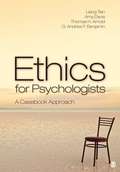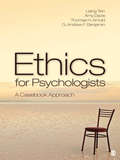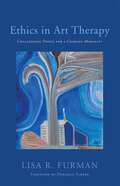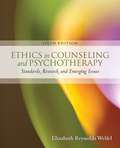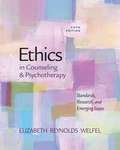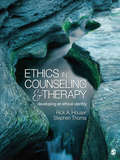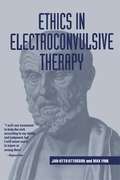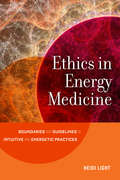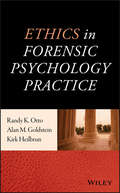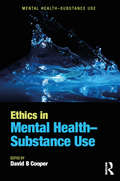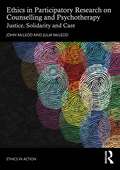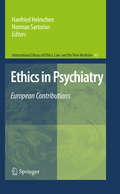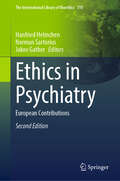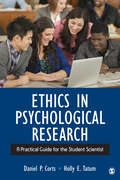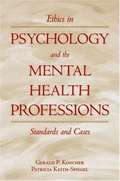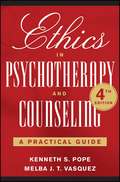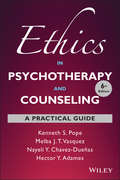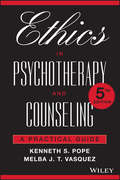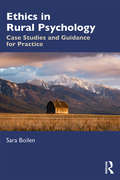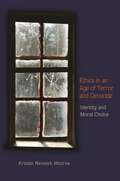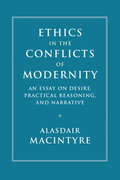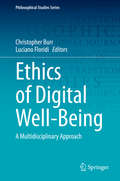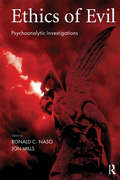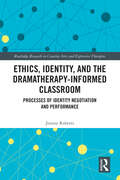- Table View
- List View
Ethics for Psychologists: A Casebook Approach
by Liang Tien Amy Davis Thomas H. Arnold Andrew F. BenjaminEthics for Psychologists provides unique multicultural, moral, and legal perspectives to the standards of conduct in the field of psychology. The book describes complex ethical dilemmas students may encounter and offers a variety of frameworks through which to examine such dilemmas.
Ethics for Psychologists: A Casebook Approach
by Thomas H. Arnold Liang T. Tien Amy S. Davis G. Andrew BenjaminWith full coverage of the APA Code of Ethics and engaging vignettes to draw students into the material, Ethics for Psychologists provides unique multicultural, moral, and legal perspectives to the standards of conduct in the field of psychology. This book describes complex ethical dilemmas students may encounter and offers a variety of frameworks through which to examine such dilemmas. Legal, moral, values-driven, and global approaches are provided in concise commentaries about the dictates of our own Code of Ethics. Students will be challenged to take control of their learning experience by moving beyond the basics of looking up each situation to find "the right thing to do," into a more active and engaged approach, with the goal of not only becoming ethical thinkers but informed decision makers.
Ethics in Art Therapy: Challenging Topics for a Complex Modality
by Deborah Farber Lisa R. FurmanDue to the complicated nature of using art and art materials in clinical practice, art therapists are often confronted with ethical considerations that are unique to their field. This book explores challenging topics in the ethical practice of art therapy. Professional guidelines do not always address the gray areas of important ethical issues in art therapy practice. Art therapists must therefore have a strong sense of personal standards by which to navigate morally ambiguous situations. Using case examples and current ethical theory, the book provides much-needed guidance for how to handle dilemmas such as receiving client art as gifts, displaying client art, religious and sexual issues, and the documentation and digital dissemination of confidential material and artwork. This book will be a valuable resource for art therapy students, graduate supervisors, new practitioners, and more experienced clinicians looking to increase their awareness of complex ethical issues.
Ethics in Counseling and Psychotherapy
by Elizabeth Reynolds WelfelRevised to reflect recent ethical, legal, and professional developments, Welfel’s ETHICS IN COUNSELING AND PSYCHOTHERAPY prepares readers to deal effectively with the issues they will confront in practice. The book’s ten-step model for ethical decision making guides students and practitioners as they work through and analyze complicated ethics cases that demonstrate some of the most challenging dilemmas they will face. Updated to integrate the new 2014 ACA Code of Ethics, this edition also explores how technology (including social networking) relates to ethical issues, and discusses the ethical issues that may arise when counseling clients from different cultural backgrounds, clients with disabilities, older adults, and clients at risk of harming others and themselves. The text familiarizes readers with the field’s key scholarly writings and, by examining emerging ethical issues, enables students to advance beyond their basic awareness and knowledge of the professional codes of ethics.
Ethics in Counseling and Psychotherapy 5th Edition
by Elizabeth Reynolds WelfelRevised to reflect recent ethical, legal, and professional developments, Welfel's contemporary and relevant ETHICS IN COUNSELING AND PSYCHOTHERAPY prepares you to deal effectively with the complex ethical and legal issues that you will confront in practice. The book's ten-step model of ethical decision making guides you as you work through and analyze complicated ethics cases and challenging dilemmas. Coverage includes legal research and the professional literature of major topics in ethics (such as consent, confidentiality, and multiple relationships) and in applied settings (such as community mental health, private practice, schools, and teaching/research). The fifth edition includes a deeper discussion of technology and ethics, as well as culturally competent ethical practice.
Ethics in Counseling and Therapy: Developing an Ethical Identity
by Rick A. Houser Stephen Joseph ThomaEthics in Counseling and Therapy develops students' ethical competence through an understanding of theory. Houser and Thoma helps the counselor form his or her own ethical identity and reflect on his or her own values and issues by presenting a theoretical framework that draws on theories from disciplines such as philosophy, sociology, and moral psychology.
Ethics in Electroconvulsive Therapy
by Jan-Otto Ottosson Max FinkFew mental illness treatments are more reviled in the public mind than Electroconvulsive Shock Therapy. However, in reality, ECT is a safe and effective treatment for cases of clinical depression and catatonia that are unresponsive to drug therapy. Also, unlike drugs, ECT has relatively few side effects. The authors argue that it is time for this historically stigmatized procedure to be reevaluated. The authors make a strong case for greater professional and public attention to the procedure's benefits, offering historical coverage of ECT-related movements, legislation, public and practitioner sentiment and the introduction of competing treatments. This volume will not only garner the interest of mental health professionals, but will call on policy makers and ethicists to examine its arguments.
Ethics in Energy Medicine: Boundaries and Guidelines for Intuitive and Energetic Practices
by Heidi LightThe first guidebook to discuss the full scope of the intuitive process and propose structures to keep practitioners and clients safeHeidi Light, a family counselor and certified hypnotherapist, asserts that we are in desperate need of guidance and standards so that we can approach the world of intuition, energy, and mysticism from a healthy and respectful place. Drawing from her more than forty years as a medical intuitive, empath, and energy tracker—as well as twenty years as a counselor in private, clinical, and institutional settings—Light offers practical, simple solutions to the alarming lack of boundaries in the fields of intuition and energy medicine. From massage therapists who just throw in a little extra energy work, to psychics who read your sister instead of you, or to practitioners who tell you to take off your clothes, Light shares case studies and vignettes of ethical boundaries mistakenly being crossed. This book explains the traditional psychological model of ethics that counselors and psychologists are taught and outlines an ethical energetics model as a framework for moving through the process of accessing intuitive information and working with energy. Experienced energy workers, those new to the field and just opening to their intuition, and those who come to them for services need to know these ethical guidelines of boundaries and consent.
Ethics in Forensic Psychology Practice
by Randy K. Otto Kirk Heilbrun Alan M. GoldsteinAN AUTHORITATIVE GUIDE TO THE CURRENT SPECIALTY GUIDELINES FOR FORENSIC PSYCHOLOGY Ethics in Forensic Psychology Practice is a comprehensive and authoritative resource that addresses major concerns of professionals who conduct evaluations, provide treatment, carry out research, as well as a guide for those who teach and train in diverse legal contexts. Including on the American Psychological Association's current Specialty Guidelines for Forensic Psychology, the standard measure for ethical and legal conduct, this important volume is organized around substantive practice issues that cut across various functions and roles. The authors include a range of topics such as training, business practices, roles, privacy, confidentiality, report writing, testifying, and more.
Ethics in Mental Health-Substance Use (Mental Health–Substance Use)
by David B CooperEthics in Mental Health-Substance Use aims to explore the comprehensive concerns and dilemmas occurring from mental health and substance use problems, and to inform, develop, and educate by sharing and pooling knowledge, and enhancing expertise, in this fast developing region of ethics and ethical care and practice. This volume concentrates on ethical concerns, dilemmas, and concepts specifically interrelated, as a collation of problem(s) that directly or indirectly affect the life of the individual and family. Whilst presenting a balanced view of what is ethically best practice today, this title challenges concepts and stimulates debate, exploring all aspects of the development in treatment, intervention and care responses, and the adoption of research-led best practice.
Ethics in Participatory Research on Counselling and Psychotherapy: Justice, Solidarity and Care (Ethics In Action)
by John McLeod Julia McLeodIncreasingly, therapy practitioners and researchers position themselves within a pluralistic perspective that draws on the value of multiple sources of knowledge. The aim of this book is to highlight the distinctive ethical challenges and opportunities associated with a pluralistic research orientation.The book begins by succinctly summarising ethical concepts and strategies, such as informed consent, confidentiality, and avoidance of harm, that form the foundations of ethically sound research. An overview of distinctive ethical features of pluralistic research is then provided, followed by a series of chapters that address specific strands of ethics work. The closing chapter discusses approaches to training and ethical inquiry, the establishment of communities of research practice, and the provision of forms of counselling and psychotherapy that promote social justice. Each chapter will open with a concise chapter outline and close with a summary of key learning points, take-home skills, and follow-up learning activities. Case examples from published studies will be used to illustrate how theory and concepts have been implemented in real-life investigative contexts.Written in plain English that is accessible to a wide range of readers, with recommended reading signposted in respect of advanced topics, this book will be an essential resource for practicing and trainee professionals and researchers in the psychological professions.
Ethics in Psychiatry: European Contributions
by Norman Sartorius Hanfried HelmchenEthics in Psychiatry: (1) presents a comprehensive review of ethical issues arising in psychiatric care and research; (2) relates ethical issues to changes and challenges of society; (3) examines the application of general ethics to specific psychiatric problems and relates these to moral implications of psychiatry practice; (4) deals with recently arising ethical problems; (5) contains contributions of leading European ethicists, philosophers, lawyers, historians and psychiatrists; (6) provides a basis for the exploration of culture-bound influences on morals, manners and customs in the light of ethical principles of global validity.
Ethics in Psychiatry: European Contributions (The International Library of Bioethics #110)
by Norman Sartorius Hanfried Helmchen Jakov GatherThis book presents a comprehensive review of ethical issues arising in psychiatric care and research. Compared to the first edition, ten of the 40 chapters comprising the book are new, dealing with topics that were not covered in the previous edition. A further 28 chapters have been updated by the previous authors or completely rewritten by new authors. Containing contributions by leading European ethicists, philosophers, legal scholars, and psychiatrists, this book presents an excellent resource of information and insights for both psychiatrists and other professionals who wish to develop knowledge, understanding, and awareness about ethical issues arising in their practice, research and public health action. Chapter 6 is available open access under a Creative Commons Attribution 4.0 International License via link.springer.com.
Ethics in Psychological Research: A Practical Guide for the Student Scientist
by Daniel Paul Corts Holly E. TatumEthics in Psychological Research is a brief, practical guide for student researchers and their mentors to answer ethical questions and navigate issues of institutional policies and academic freedom. Authors Daniel P. Corts and Holly E. Tatum guide readers in identifying, preventing, mitigating, and resolving ethical issues in research using a unique ethical framework. Each of the standalone chapters provide real-life examples of ethical questions, a description of scholarly work on the matter, and suggestions for how to address similar problems should they arise in the researcher’s own work. The book makes for a succinct and easy-to-use reference for any student conducting research in the behavioral sciences.
Ethics in Psychological Research: A Practical Guide for the Student Scientist
by Daniel Paul Corts Holly E. TatumEthics in Psychological Research is a brief, practical guide for student researchers and their mentors to answer ethical questions and navigate issues of institutional policies and academic freedom. Authors Daniel P. Corts and Holly E. Tatum guide readers in identifying, preventing, mitigating, and resolving ethical issues in research using a unique ethical framework. Each of the standalone chapters provide real-life examples of ethical questions, a description of scholarly work on the matter, and suggestions for how to address similar problems should they arise in the researcher’s own work. The book makes for a succinct and easy-to-use reference for any student conducting research in the behavioral sciences.
Ethics in Psychology and the Mental Health Professions: Standards and Cases (3rd edition)
by Patricia Keith-Spiegel Gerald P. KoocherWe seek to present the full range of contemporary ethical issues in the mental health professions, not only as relevant and intriguing but also as integral and unavoidable aspects of the our complex professional roles and social responsibilities. Regardless of one's training speciality or the work setting, critical dilemmas will arise -- probably with some regularity--and we will often need to make challenging decisions or take intervention steps, sometimes right on the spot.
Ethics in Psychotherapy and Counseling
by Kenneth S. Pope Melba J. T. VasquezPraise for Ethics in Psychotherapy and Counseling, Fourth Edition "A stunningly good book. . . . If there is only one book you buy on ethics, this is the one. " -David H. Barlow, PhD, ABPP, Professor of Psychology and Psychiatry, Boston University "The Fourth Edition continues to be the gold standard. . . . a must-read in every counseling/therapy training program. It is that good and valuable. " -Derald Wing Sue, PhD, Professor of Psychology and Education, Teachers College, Columbia University "A must-have for therapists at every step of their career from student to wise elder. " -Bonnie Strickland, PhD, former president, American Psychological Association "This Fourth Edition of the best book in its field has much timely new material. . . . A brilliant addition is an exploration of how reasonable people can conscientiously follow the same ethical principles yet reach different conclusions . . . an essential sourcebook. " -Patrick O'Neill, PhD, former president, Canadian Psychological Association "Essential for all practicing mental health professionals and students. " -Nadine Kaslow, PhD, ABPP, President, American Board of Professional Psychology "I particularly enjoyed the chapter on ethical practice in the electronic world, which was informative even to this highly tech-savvy psychologist. The chapter on responses to the interrogations issue is destined to be a classic. . . . Bravo! Mandatory reading. " -Laura Brown, PhD, ABPP, 2010 President, APA Division of Trauma Psychology "There's no better resource to have at your fingertips. " -Eric Drogin, JD, PhD, ABPP, former chair, APA Committee on Professional Practice and Standards and APA Committee on Legal Issues "Two of psychology's national treasures, Drs. Ken Pope and Melba Vasquez walk the walk of psychotherapy ethics. Simply the best book in its genre. " -John Norcross, PhD, ABPP, Professor of Psychology and Distinguished University Fellow, University of Scranton
Ethics in Psychotherapy and Counseling: A Practical Guide
by Kenneth S. Pope Hector Y. Adames Nayeli Y. Chavez-Dueñas Melba J. VasquezTake your ethical reasoning and practice to the next level with timely discussions of new and reoccuring issues in psychology and counseling. In the newly revised Sixth Edition of Ethics in Psychotherapy and Counseling: A Practical Guide, a distinguished team of psychologists deliver a compilation of practical and creative approaches to the responsibilities, challenges, and opportunities encountered by therapists and counselors in their work. The book covers the many changes and difficulties created by new technologies like electronic health records, videoconferencing, texting, and practicing across state and provincial boundaries. Using a new, easy-to-navigate structure and including brand new chapters on cultural ethics, social justice and human rights ethics, and the application of strategies for self-care, the authors discuss complex issues in a straightforward and accessible way. Conversations about moral distress and moral courage and actionable steps to strengthen ethics in organizational settings round out the useful material contained within. Once referred to as the "conscience of psychology," this must-read book also includes: A thorough introduction to the foundations of psychotherapeutic ethics, including ethics in real life, ethics in theories and codes, cultural context, ethical decision making, and moral courage. An exploration of common sources of ethical problems and pitfalls, including: pseudoscience, ethical fallacies, ethical judgement errors, language and rationalizations Practical discussions of special topics in ethics, including informed consent and informed refusal, using strategies for self-care, responding to ethics, licensing, and malpractice complaints, and confidentiality. In-depth examination of timely issues, including sexual attraction to patients, digital therapy, and responding to suicidal risk. Perfect for individual practitioners and teachers of graduate courses, seminars, and continuing education classes, Ethics in Psychotherapy and Counseling: A Practical Guide will also earn a place in the libraries of forensic psychologists and other expert witnesses preparing to testify on the standard of care in malpractice cases.
Ethics in Psychotherapy and Counseling: A Practical Guide (The\jossey-bass Social And Behavioral Science Ser.)
by Kenneth S. Pope Melba J. VasquezThe ethics book no psychology student or professional should be without Thoroughly updated and expanded to include recent research findings, landmark legal decisions, the Hoffman Investigation Report, and changes in the ethical guidelines of the American Psychological Association and the Canadian Psychological Association, the new 5th edition of Ethics in Psychotherapy and Counseling covers the latest developments in ethical thinking, standards, and practice. You'll learn how to strengthen your ethical awareness, judgement, and decision-making. Distinguished Emeritus Professor Don Meichenbaum described the 5th edition as 'a MUST READ book for both beginning and seasoned clinicians' and Professor David H. Barlow wrote, 'A stunningly good book. . . . If there is only one book you buy on ethics, this is the one.' Covers the many changes and challenges brought about by new technology, EHRs, videoconferencing, and texting, as well as practicing across state and provincial borders Discusses moral distress and moral courage Includes 5 chapters on different aspects of critical thinking about ethical challenges, including a chapter on 'Ethics Placebos, Cons, and Creative Cheating: A User's Guide' Deals with complex issue of culture, race, religion, sexual identity, sexual orientation, and politics Provides steps to strengthen ethics in organizations Offers guidance on responding to ethics, licensing, and malpractice complaints—not to imply that you'll need to after reading this book! Keeps the focus on practical, creative approaches to the responsibilities, challenges, and opportunities encountered by therapists and counselors in their work.
Ethics in Rural Psychology: Case Studies and Guidance for Practice
by Sara BoilenEthics in Rural Psychology provides readers with theoretical underpinnings, practical applications, and empirically based knowledge of the practice of psychology in rural communities. Dr. Boilen explores the similarities and differences within and across rural American communities to provide a framework for understanding this vast and varied population. Focusing on the ethical considerations unique to these communities, chapters use illustrative case examples, useful exercises, and personal anecdotes to highlight obstacles unique to rural areas. Finally, the book emphasizes the opportunity to be innovative and creative in rural practice, demonstrating how rural practices hold promise for cutting-edge advancements in the field of psychology. This book will serve practitioners, students, and researchers as a primer, handbook, and road map for the challenging and rewarding clinical work that awaits in rural America.
Ethics in an Age of Terror and Genocide: Identity and Moral Choice
by Kristen Renwick MonroeThe significance of identity and psychology in determining moral choiceWhat causes genocide? Why do some stand by, doing nothing, while others risk their lives to help the persecuted? Ethics in an Age of Terror and Genocide analyzes riveting interviews with bystanders, Nazi supporters, and rescuers of Jews during the Holocaust to lay bare critical psychological forces operating during genocide. Monroe's insightful examination of these moving—and disturbing—interviews underscores the significance of identity for moral choice.Monroe finds that self-image and identity—especially the sense of self in relation to others—determine and delineate our choice options, not just morally but cognitively. She introduces the concept of moral salience to explain how we establish a critical psychological relationship with others, classifying individuals in need as "people just like us" or reducing them to strangers perceived as different, threatening, or even beyond the boundaries of our concern. Monroe explicates the psychological dehumanization that is a prerequisite for genocide and uses her knowledge of human behavior during the Holocaust to develop a broader theory of moral choice, one applicable to other forms of ethnic, religious, racial, and sectarian prejudice, aggression, and violence. Her book fills a long-standing void in ethics and suggests that identity is more fundamental than reasoning in our treatment of others.
Ethics in the Conflicts of Modernity
by Alasdair MacintyreAlasdair MacIntyre explores some central philosophical, political and moral claims of modernity and argues that a proper understanding of human goods requires a rejection of these claims. In a wide-ranging discussion, he considers how normative and evaluative judgments are to be understood, how desire and practical reasoning are to be characterized, what it is to have adequate self-knowledge, and what part narrative plays in our understanding of human lives. He asks, further, what it would be to understand the modern condition from a neo-Aristotelian or Thomistic perspective, and argues that Thomistic Aristotelianism, informed by Marx's insights, provides us with resources for constructing a contemporary politics and ethics which both enable and require us to act against modernity from within modernity. This rich and important book builds on and advances MacIntyre's thinking in ethics and moral philosophy, and will be of great interest to readers in both fields.
Ethics of Digital Well-Being: A Multidisciplinary Approach (Philosophical Studies Series #140)
by Luciano Floridi Christopher BurrThis book brings together international experts from a wide variety of disciplines, in order to understand the impact that digital technologies have had on our well-being as well as our understanding of what it means to live a life that is good for us. The multidisciplinary perspective that this collection offers demonstrates the breadth and importance of these discussions, and represents a pivotal and state-of-the-art contribution to the ongoing discussion concerning digital well-being. Furthermore, this is the first book that captures the complex set of issues that are implicated by the ongoing development of digital technologies, impacting our well-being either directly or indirectly. By helping to clarify some of the most pertinent issues, this collection clarifies the risks and opportunities associated with deploying digital technologies in various social domains.Chapter 2 is available open access under a Creative Commons Attribution 4.0 International License via link.springer.com.
Ethics of Evil: Psychoanalytic Investigations
by Jon MillsIn today's world where every form of transgression enjoys a psychological motive and rational justification, psychoanalysis stands alone in its ability to uncover the hidden motives that inform individual and social collective behaviour. Both in theory and practice, it bears witness to the impact of anonymity on the potential for perpetration, especially when others are experienced as faceless, disposable objects whose otherness is, at bottom, but a projection, displacement, and denial of our own interiority-in short, the evil within. In keeping with this perspective, Ethics of Evil rejects facile rationalizations of violence; it also rejects the idea that evil, as a concept, is inscrutable or animated by demonic forces. Instead, it evaluates the moral framework in which evil is situated, providing a descriptive understanding of it as a plurality and a depth psychological perspective on the threat it poses for our well-being and ways of life. In so doing, it also fashions and articulates an ethical stance that recognizes the intrinsic link between human freedom and the potential for evil.
Ethics, Identity, and the Dramatherapy-informed Classroom: Processes of Identity Negotiation and Performance (Routledge Research in Creative Arts and Expressive Therapies)
by Jeanne RobertsUsing the drama classroom to shape an active, student-centred space and foster a new perspective for understanding the dramatherapeutic change-process, this book explores the processes that underpin the ways young people negotiate and perform their identities as ethical people.Arguing for the retention of process-based exploratory drama on the curriculum, chapters critique the impact of neoliberalism and managerialism on the development of young people’s ethics and values. Using concepts such as aesthetic distance, encoding, the role of audience and witness, and the contrast between individual, multi, and group roles, to enable students to develop as thinking, reflecting people, the book argues that dramatherapy should not be limited to clinical settings, disconnected from classrooms and the pedagogical contributions that it can make. By absorbing dramatherapy into the broader field of education, an expanded understanding of the concept of the managed classroom space can be gained, based on an understanding of the multiple embodied psychosocial relational processes at play in the drama classroom.This innately multidisciplinary book will be of use to scholars, researchers, and postgraduate students studying drama education, dramatherapy, and curriculum studies more broadly. Drama teachers and educators will also find this volume of use.
